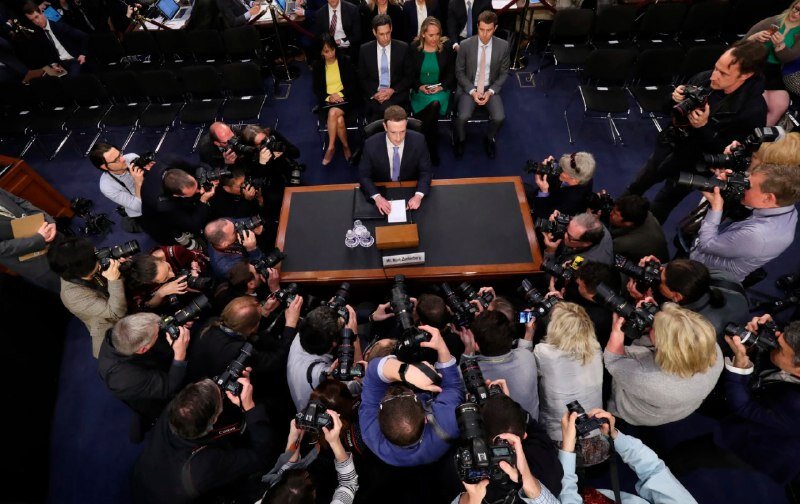Meta: An extension of Western governments
EXCLUSIVE: Evidence obtained by the Tehran Times shows politicians manage Meta’s content

TEHRAN - Western-based social media platforms like Facebook have been positioning themselves as innocuous and neutral platforms that at times get misused and taken advantage of by malicious users.
When Facebook was accused of giving rise to violence against Muslims in Myanmar, which eventually led to the massacre of over 25,000 people, it attributed the situation to its ignorance of human rights risks. Sometime after that in 2019, the platform announced it was establishing a “Strategic Response Team (SRT)” to help prevent the spread of hate speech and avoid fueling another genocide.
In the most recent genocide taking place, however, Facebook is once again being accused of stifling truth and enabling deadly violence. Figures show that since the beginning of Israel’s latest war on Gaza, Meta has subjected pro-Palestinian accounts and posts to systematic censorship while turning a blind eye to Israeli accounts promoting racism and Islamophobia.
Over 90% of pro-Palestinian content has been deleted in the past 150 days. The company also removed the Instagram and Facebook accounts of Leader of the Islamic Revolution Ayatollah Seyyed Ali Khamenei last month, in response to his vocal position on Israel’s genocidal war in Gaza.
According to information obtained by The Tehran Times, Meta's complicity in violence against specific groups is not merely due to negligence. Meta appears to be seeking content management guidance from American and Israeli think tanks, rather than leveraging insights from local entities with an in-depth comprehension of content that could threaten the peace and stability of their nation.
WestExec, established in 2017 by U.S. Secretary of State Antony Blinken, and staffed by former and current White House or Congress officials, is among the advisory bodies guiding the tech conglomerate on identifying hazardous content and determining which posts should have broad outreach.
In emails* reviewed by the Tehran Times, Facebook’s SRT asks WestExec to analyze notable developments that include “geopolitical tensions, ethnic/sectarian violence, human rights violations, increasing refugees, hate speech, political repression/polarization, civil unrest/protests, social media restrictions, internet shutdowns, spread of misinformation, repression of media, and elections” in over 38 countries in Asia, Europe, and Africa.
The WestExec workers assigned to provide feedback are Cristina Killingsworth, Dennis B. Ross, Vikram J. Singh, Danny Russel, Tyler Beckelman, Lawrence J. Gumbiner, Nick Zimmerman, and Rachel Ellehuus. All these individuals are currently in positions within the White House or have previously held senior roles in the U.S. government or military.
While Meta may claim it is not directly instructed by the U.S. government to promote or remove specific content, receiving guidance from American politicians regarding its content moderation implies that what users see on Facebook and Instagram is at the end of the day, aligned with the White House's preferences.
In another email scrutinized by the Tehran Times, Facebook requests WestExec to assess election risk ratings for various countries like Lebanon and Bahrain. Given the U.S.'s track record of involvement in foreign nations' internal affairs, this visibly shows U.S. interference in other countries' elections by influencing the content disseminated on major social media platforms.
Meta is also in touch with prominent intelligence officers in the West. In more information obtained by the Tehran Times, it was revealed that Ian McCredie may have used Facebook’s help to skew election results in Guyana. McCredie is an MI6 agent with over 30 years of experience. He has helped plan and execute intelligence operations and secret diplomacy in Iran, Syria, Jordan, Egypt, Saudi Arabia, Iraq, Zambia, Zimbabwe, South Africa, the United States, and Europe.
While writing an email to an employee in Facebook’s SRT team in 2020, the British intelligence officer asks whether the platform is "paying attention" to the upcoming March elections in Guyana.
“Social media is the fora of choice for electioneering. Guyana is about to become exceptionally prosperous. Whoever wins will end up controlling many hundreds of billions of dollars in oil revenue,” wrote McCredie on January 15, 2020. In the email seen by the Tehran Times, he also explains that one of the leading parties is close to China.
Sources have told the Tehran Times that McCredie is still with the MI6 and that he is a determining force in intelligence operations against a raft of countries including Iran.
Meta’s close and comfortable relationship with high-ranking intelligence officers is another sign the company is not entirely truthful with its users. If McCredie believed the chances of receiving assistance were slim, he most probably wouldn't have reached out to Meta for help in election engineering.
Meta should clarify why it is working with Western politicians to manage its content, and why intelligence officers feel so comfortable asking the company to help obstruct democracy in countries around the world.
*Copies of emails mentioned in this article are in possession of the Tehran Times.
Leave a Comment